Memory Wars in Psychology: Debate, Validity, and Resolution Analysis
VerifiedAdded on 2023/06/12
|9
|2895
|338
Essay
AI Summary
This essay delves into the 'memory wars' of the late 20th century, a significant debate within psychology concerning the validity and reliability of recovered memories, particularly those related to traumatic events like Child Sexual Abuse (CSA). It highlights the clash between clinicians and memory scientists, with one side emphasizing the importance of traumatic memories in shaping individual identity and the other cautioning against the potential for false memories, possibly implanted by therapists. The essay references key figures and experiments, such as Loftus's research on false memories and the 'Lost in the Shopping Mall' experiment, to illustrate the arguments on both sides. It also discusses the establishment of organizations like the False Memory Syndrome Foundation and the use of methods like the Rorschach test and Statement Validity Analysis to assess memory authenticity. Ultimately, the essay concludes that the 'memory wars' remain unresolved, with ongoing debates about the nature and validity of recovered memories continuing to shape the field of psychology.
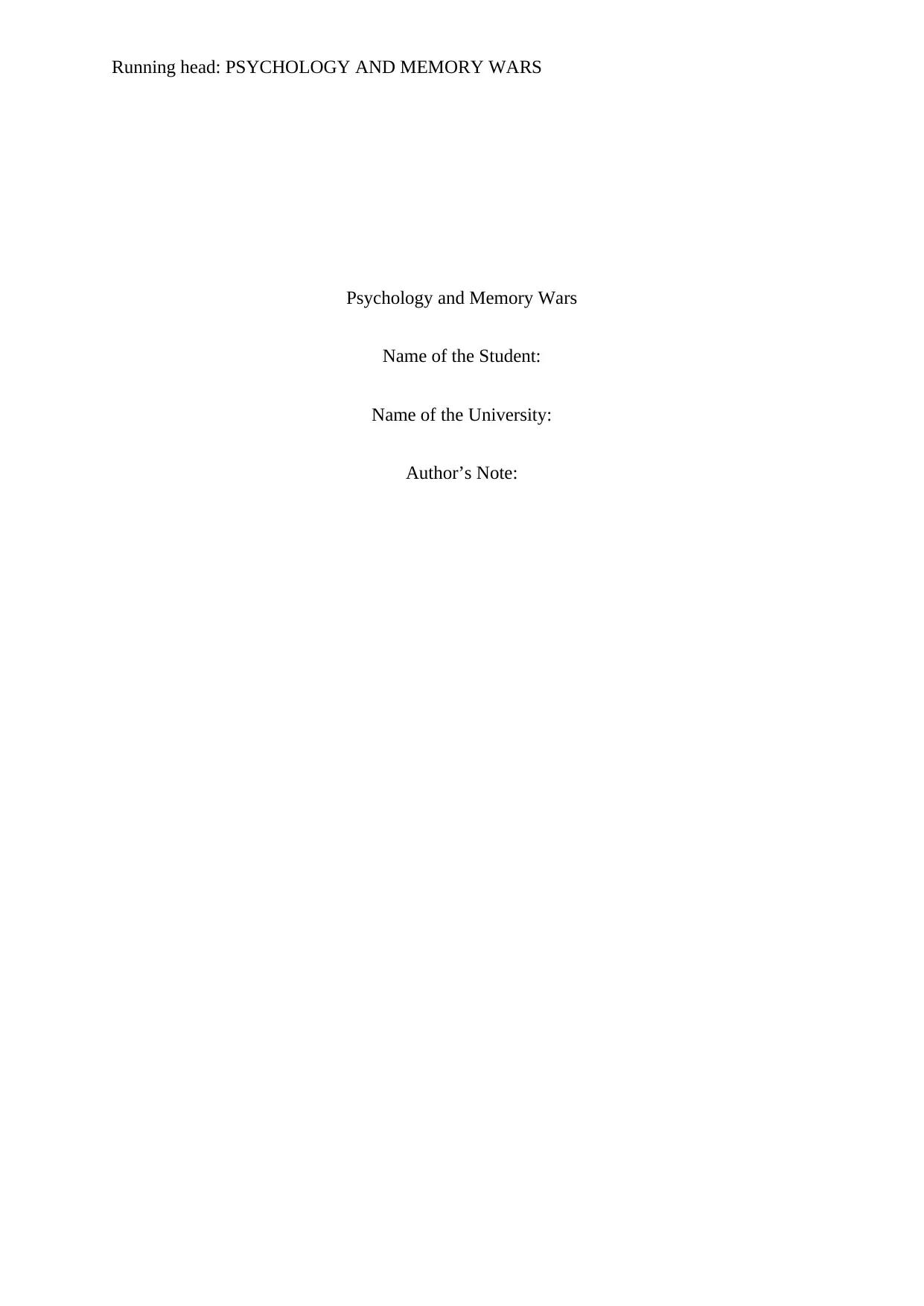
Running head: PSYCHOLOGY AND MEMORY WARS
Psychology and Memory Wars
Name of the Student:
Name of the University:
Author’s Note:
Psychology and Memory Wars
Name of the Student:
Name of the University:
Author’s Note:
Paraphrase This Document
Need a fresh take? Get an instant paraphrase of this document with our AI Paraphraser
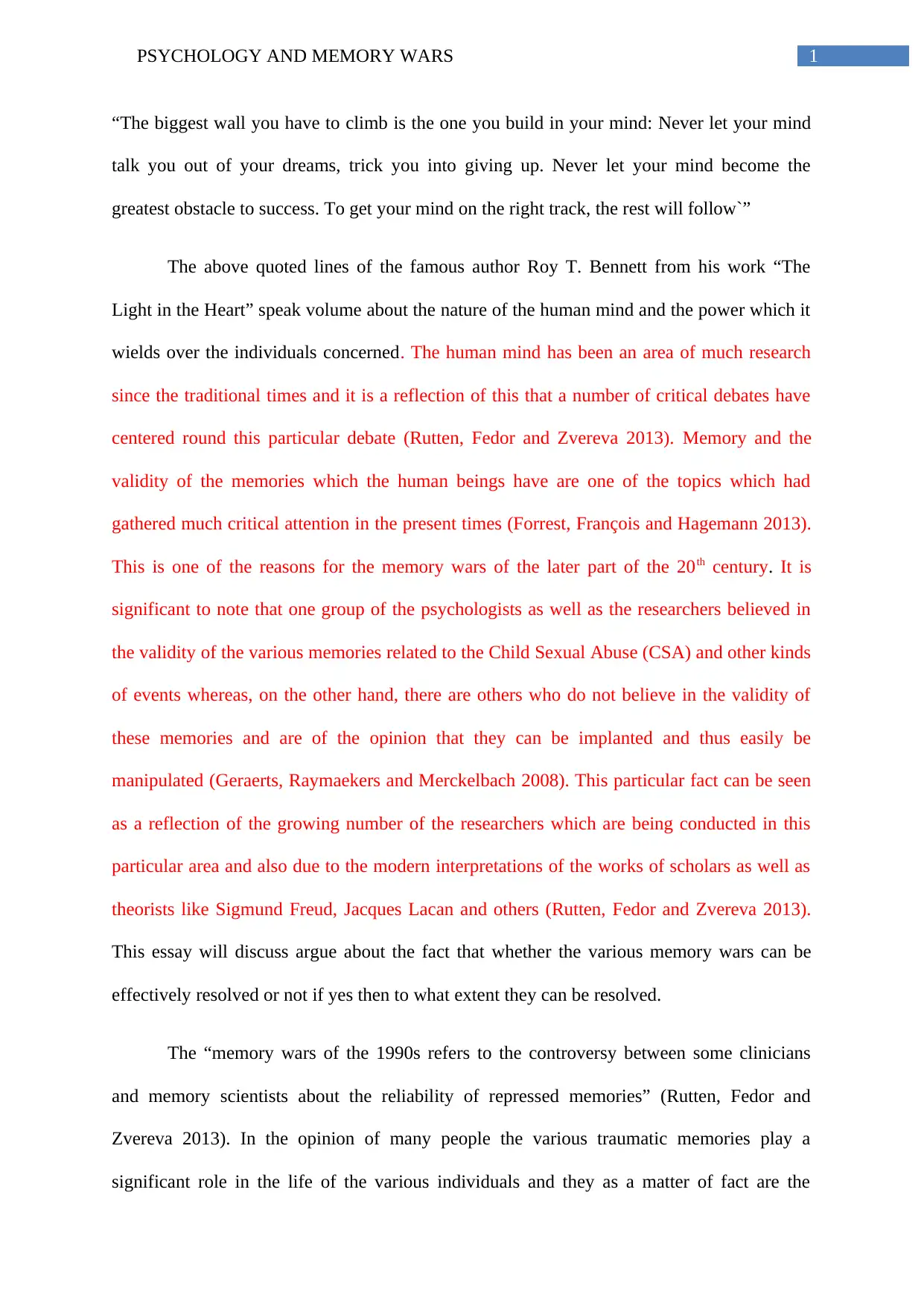
1PSYCHOLOGY AND MEMORY WARS
“The biggest wall you have to climb is the one you build in your mind: Never let your mind
talk you out of your dreams, trick you into giving up. Never let your mind become the
greatest obstacle to success. To get your mind on the right track, the rest will follow`”
The above quoted lines of the famous author Roy T. Bennett from his work “The
Light in the Heart” speak volume about the nature of the human mind and the power which it
wields over the individuals concerned. The human mind has been an area of much research
since the traditional times and it is a reflection of this that a number of critical debates have
centered round this particular debate (Rutten, Fedor and Zvereva 2013). Memory and the
validity of the memories which the human beings have are one of the topics which had
gathered much critical attention in the present times (Forrest, François and Hagemann 2013).
This is one of the reasons for the memory wars of the later part of the 20th century. It is
significant to note that one group of the psychologists as well as the researchers believed in
the validity of the various memories related to the Child Sexual Abuse (CSA) and other kinds
of events whereas, on the other hand, there are others who do not believe in the validity of
these memories and are of the opinion that they can be implanted and thus easily be
manipulated (Geraerts, Raymaekers and Merckelbach 2008). This particular fact can be seen
as a reflection of the growing number of the researchers which are being conducted in this
particular area and also due to the modern interpretations of the works of scholars as well as
theorists like Sigmund Freud, Jacques Lacan and others (Rutten, Fedor and Zvereva 2013).
This essay will discuss argue about the fact that whether the various memory wars can be
effectively resolved or not if yes then to what extent they can be resolved.
The “memory wars of the 1990s refers to the controversy between some clinicians
and memory scientists about the reliability of repressed memories” (Rutten, Fedor and
Zvereva 2013). In the opinion of many people the various traumatic memories play a
significant role in the life of the various individuals and they as a matter of fact are the
“The biggest wall you have to climb is the one you build in your mind: Never let your mind
talk you out of your dreams, trick you into giving up. Never let your mind become the
greatest obstacle to success. To get your mind on the right track, the rest will follow`”
The above quoted lines of the famous author Roy T. Bennett from his work “The
Light in the Heart” speak volume about the nature of the human mind and the power which it
wields over the individuals concerned. The human mind has been an area of much research
since the traditional times and it is a reflection of this that a number of critical debates have
centered round this particular debate (Rutten, Fedor and Zvereva 2013). Memory and the
validity of the memories which the human beings have are one of the topics which had
gathered much critical attention in the present times (Forrest, François and Hagemann 2013).
This is one of the reasons for the memory wars of the later part of the 20th century. It is
significant to note that one group of the psychologists as well as the researchers believed in
the validity of the various memories related to the Child Sexual Abuse (CSA) and other kinds
of events whereas, on the other hand, there are others who do not believe in the validity of
these memories and are of the opinion that they can be implanted and thus easily be
manipulated (Geraerts, Raymaekers and Merckelbach 2008). This particular fact can be seen
as a reflection of the growing number of the researchers which are being conducted in this
particular area and also due to the modern interpretations of the works of scholars as well as
theorists like Sigmund Freud, Jacques Lacan and others (Rutten, Fedor and Zvereva 2013).
This essay will discuss argue about the fact that whether the various memory wars can be
effectively resolved or not if yes then to what extent they can be resolved.
The “memory wars of the 1990s refers to the controversy between some clinicians
and memory scientists about the reliability of repressed memories” (Rutten, Fedor and
Zvereva 2013). In the opinion of many people the various traumatic memories play a
significant role in the life of the various individuals and they as a matter of fact are the
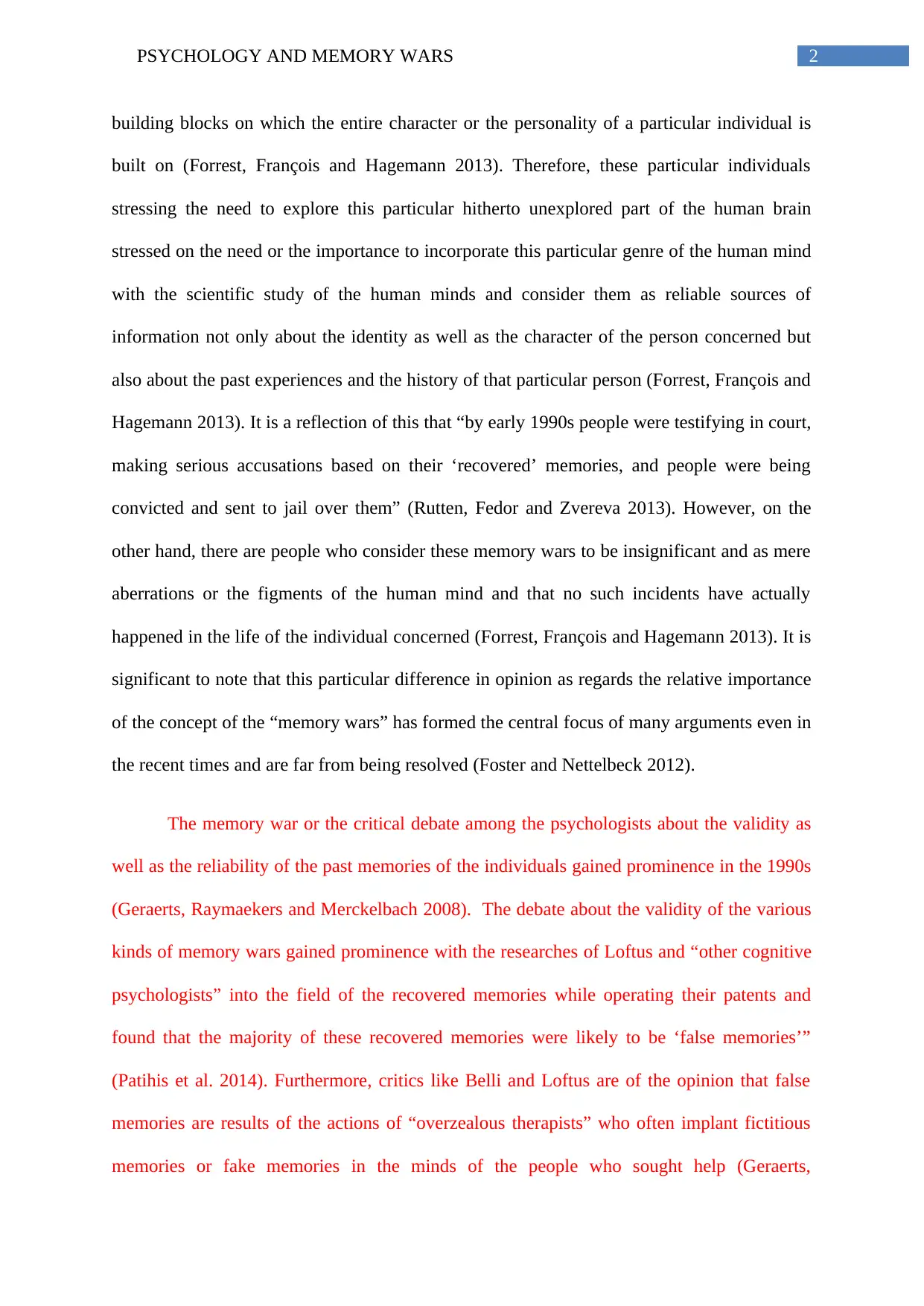
2PSYCHOLOGY AND MEMORY WARS
building blocks on which the entire character or the personality of a particular individual is
built on (Forrest, François and Hagemann 2013). Therefore, these particular individuals
stressing the need to explore this particular hitherto unexplored part of the human brain
stressed on the need or the importance to incorporate this particular genre of the human mind
with the scientific study of the human minds and consider them as reliable sources of
information not only about the identity as well as the character of the person concerned but
also about the past experiences and the history of that particular person (Forrest, François and
Hagemann 2013). It is a reflection of this that “by early 1990s people were testifying in court,
making serious accusations based on their ‘recovered’ memories, and people were being
convicted and sent to jail over them” (Rutten, Fedor and Zvereva 2013). However, on the
other hand, there are people who consider these memory wars to be insignificant and as mere
aberrations or the figments of the human mind and that no such incidents have actually
happened in the life of the individual concerned (Forrest, François and Hagemann 2013). It is
significant to note that this particular difference in opinion as regards the relative importance
of the concept of the “memory wars” has formed the central focus of many arguments even in
the recent times and are far from being resolved (Foster and Nettelbeck 2012).
The memory war or the critical debate among the psychologists about the validity as
well as the reliability of the past memories of the individuals gained prominence in the 1990s
(Geraerts, Raymaekers and Merckelbach 2008). The debate about the validity of the various
kinds of memory wars gained prominence with the researches of Loftus and “other cognitive
psychologists” into the field of the recovered memories while operating their patents and
found that the majority of these recovered memories were likely to be ‘false memories’”
(Patihis et al. 2014). Furthermore, critics like Belli and Loftus are of the opinion that false
memories are results of the actions of “overzealous therapists” who often implant fictitious
memories or fake memories in the minds of the people who sought help (Geraerts,
building blocks on which the entire character or the personality of a particular individual is
built on (Forrest, François and Hagemann 2013). Therefore, these particular individuals
stressing the need to explore this particular hitherto unexplored part of the human brain
stressed on the need or the importance to incorporate this particular genre of the human mind
with the scientific study of the human minds and consider them as reliable sources of
information not only about the identity as well as the character of the person concerned but
also about the past experiences and the history of that particular person (Forrest, François and
Hagemann 2013). It is a reflection of this that “by early 1990s people were testifying in court,
making serious accusations based on their ‘recovered’ memories, and people were being
convicted and sent to jail over them” (Rutten, Fedor and Zvereva 2013). However, on the
other hand, there are people who consider these memory wars to be insignificant and as mere
aberrations or the figments of the human mind and that no such incidents have actually
happened in the life of the individual concerned (Forrest, François and Hagemann 2013). It is
significant to note that this particular difference in opinion as regards the relative importance
of the concept of the “memory wars” has formed the central focus of many arguments even in
the recent times and are far from being resolved (Foster and Nettelbeck 2012).
The memory war or the critical debate among the psychologists about the validity as
well as the reliability of the past memories of the individuals gained prominence in the 1990s
(Geraerts, Raymaekers and Merckelbach 2008). The debate about the validity of the various
kinds of memory wars gained prominence with the researches of Loftus and “other cognitive
psychologists” into the field of the recovered memories while operating their patents and
found that the majority of these recovered memories were likely to be ‘false memories’”
(Patihis et al. 2014). Furthermore, critics like Belli and Loftus are of the opinion that false
memories are results of the actions of “overzealous therapists” who often implant fictitious
memories or fake memories in the minds of the people who sought help (Geraerts,
⊘ This is a preview!⊘
Do you want full access?
Subscribe today to unlock all pages.

Trusted by 1+ million students worldwide
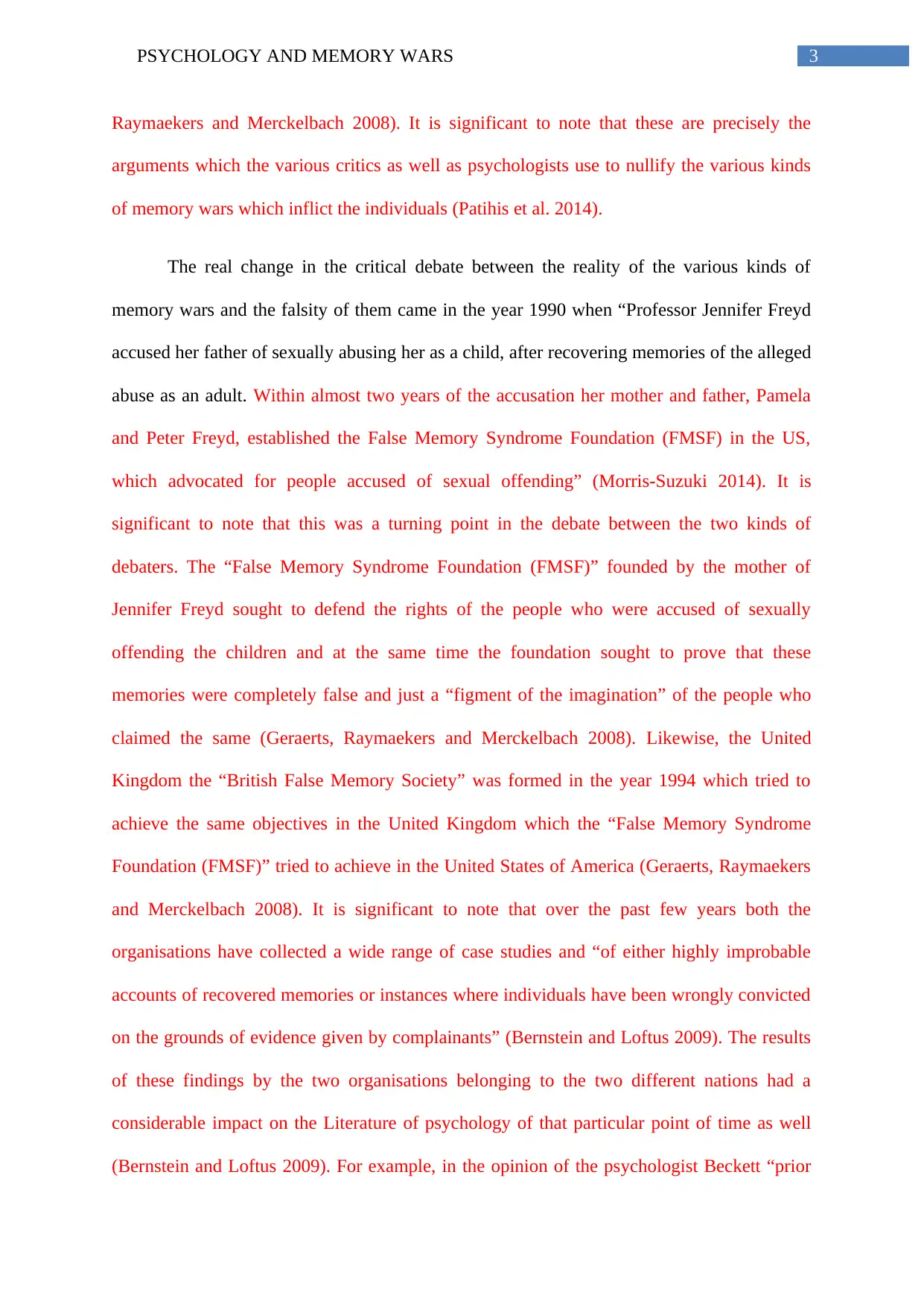
3PSYCHOLOGY AND MEMORY WARS
Raymaekers and Merckelbach 2008). It is significant to note that these are precisely the
arguments which the various critics as well as psychologists use to nullify the various kinds
of memory wars which inflict the individuals (Patihis et al. 2014).
The real change in the critical debate between the reality of the various kinds of
memory wars and the falsity of them came in the year 1990 when “Professor Jennifer Freyd
accused her father of sexually abusing her as a child, after recovering memories of the alleged
abuse as an adult. Within almost two years of the accusation her mother and father, Pamela
and Peter Freyd, established the False Memory Syndrome Foundation (FMSF) in the US,
which advocated for people accused of sexual offending” (Morris-Suzuki 2014). It is
significant to note that this was a turning point in the debate between the two kinds of
debaters. The “False Memory Syndrome Foundation (FMSF)” founded by the mother of
Jennifer Freyd sought to defend the rights of the people who were accused of sexually
offending the children and at the same time the foundation sought to prove that these
memories were completely false and just a “figment of the imagination” of the people who
claimed the same (Geraerts, Raymaekers and Merckelbach 2008). Likewise, the United
Kingdom the “British False Memory Society” was formed in the year 1994 which tried to
achieve the same objectives in the United Kingdom which the “False Memory Syndrome
Foundation (FMSF)” tried to achieve in the United States of America (Geraerts, Raymaekers
and Merckelbach 2008). It is significant to note that over the past few years both the
organisations have collected a wide range of case studies and “of either highly improbable
accounts of recovered memories or instances where individuals have been wrongly convicted
on the grounds of evidence given by complainants” (Bernstein and Loftus 2009). The results
of these findings by the two organisations belonging to the two different nations had a
considerable impact on the Literature of psychology of that particular point of time as well
(Bernstein and Loftus 2009). For example, in the opinion of the psychologist Beckett “prior
Raymaekers and Merckelbach 2008). It is significant to note that these are precisely the
arguments which the various critics as well as psychologists use to nullify the various kinds
of memory wars which inflict the individuals (Patihis et al. 2014).
The real change in the critical debate between the reality of the various kinds of
memory wars and the falsity of them came in the year 1990 when “Professor Jennifer Freyd
accused her father of sexually abusing her as a child, after recovering memories of the alleged
abuse as an adult. Within almost two years of the accusation her mother and father, Pamela
and Peter Freyd, established the False Memory Syndrome Foundation (FMSF) in the US,
which advocated for people accused of sexual offending” (Morris-Suzuki 2014). It is
significant to note that this was a turning point in the debate between the two kinds of
debaters. The “False Memory Syndrome Foundation (FMSF)” founded by the mother of
Jennifer Freyd sought to defend the rights of the people who were accused of sexually
offending the children and at the same time the foundation sought to prove that these
memories were completely false and just a “figment of the imagination” of the people who
claimed the same (Geraerts, Raymaekers and Merckelbach 2008). Likewise, the United
Kingdom the “British False Memory Society” was formed in the year 1994 which tried to
achieve the same objectives in the United Kingdom which the “False Memory Syndrome
Foundation (FMSF)” tried to achieve in the United States of America (Geraerts, Raymaekers
and Merckelbach 2008). It is significant to note that over the past few years both the
organisations have collected a wide range of case studies and “of either highly improbable
accounts of recovered memories or instances where individuals have been wrongly convicted
on the grounds of evidence given by complainants” (Bernstein and Loftus 2009). The results
of these findings by the two organisations belonging to the two different nations had a
considerable impact on the Literature of psychology of that particular point of time as well
(Bernstein and Loftus 2009). For example, in the opinion of the psychologist Beckett “prior
Paraphrase This Document
Need a fresh take? Get an instant paraphrase of this document with our AI Paraphraser
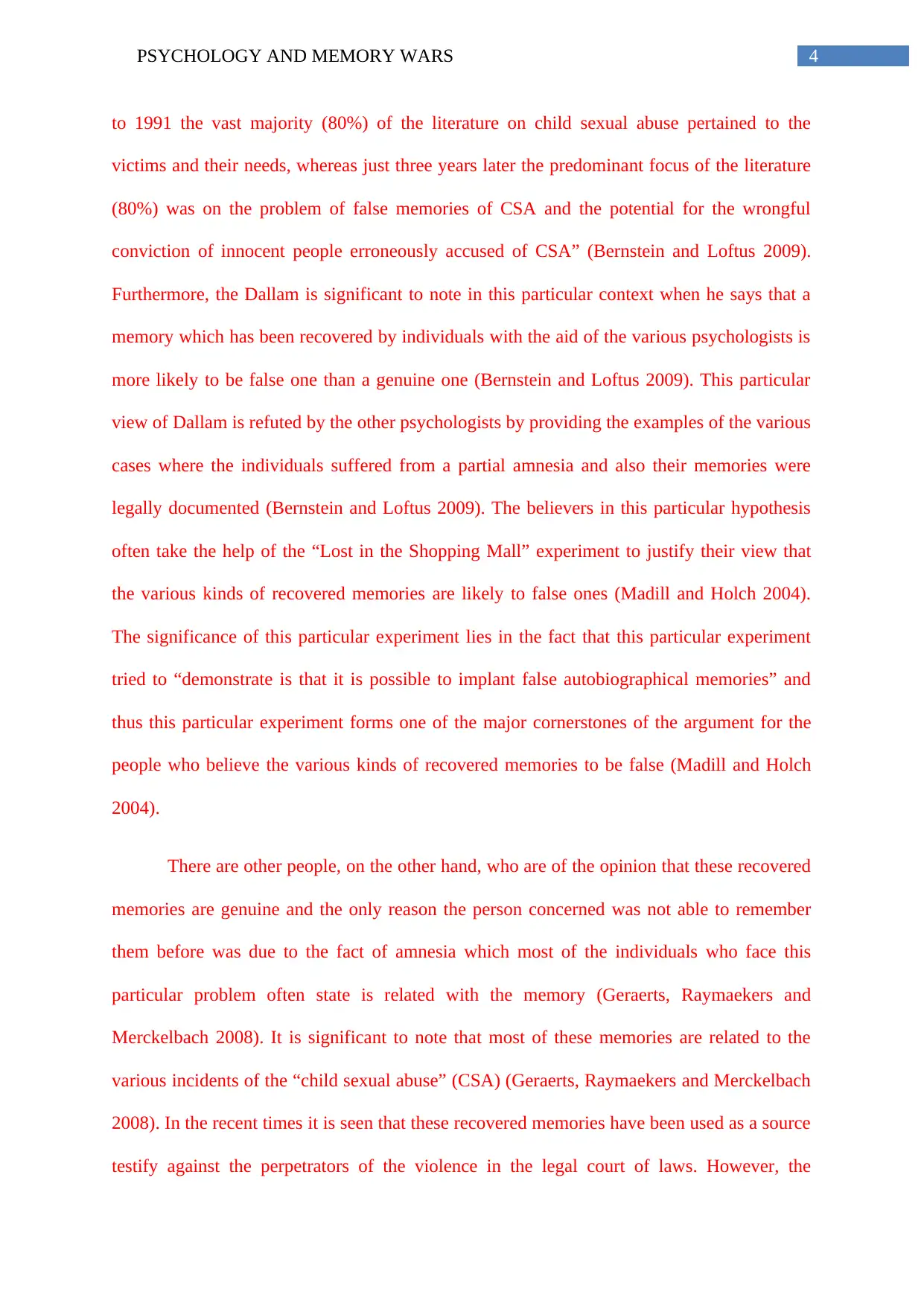
4PSYCHOLOGY AND MEMORY WARS
to 1991 the vast majority (80%) of the literature on child sexual abuse pertained to the
victims and their needs, whereas just three years later the predominant focus of the literature
(80%) was on the problem of false memories of CSA and the potential for the wrongful
conviction of innocent people erroneously accused of CSA” (Bernstein and Loftus 2009).
Furthermore, the Dallam is significant to note in this particular context when he says that a
memory which has been recovered by individuals with the aid of the various psychologists is
more likely to be false one than a genuine one (Bernstein and Loftus 2009). This particular
view of Dallam is refuted by the other psychologists by providing the examples of the various
cases where the individuals suffered from a partial amnesia and also their memories were
legally documented (Bernstein and Loftus 2009). The believers in this particular hypothesis
often take the help of the “Lost in the Shopping Mall” experiment to justify their view that
the various kinds of recovered memories are likely to false ones (Madill and Holch 2004).
The significance of this particular experiment lies in the fact that this particular experiment
tried to “demonstrate is that it is possible to implant false autobiographical memories” and
thus this particular experiment forms one of the major cornerstones of the argument for the
people who believe the various kinds of recovered memories to be false (Madill and Holch
2004).
There are other people, on the other hand, who are of the opinion that these recovered
memories are genuine and the only reason the person concerned was not able to remember
them before was due to the fact of amnesia which most of the individuals who face this
particular problem often state is related with the memory (Geraerts, Raymaekers and
Merckelbach 2008). It is significant to note that most of these memories are related to the
various incidents of the “child sexual abuse” (CSA) (Geraerts, Raymaekers and Merckelbach
2008). In the recent times it is seen that these recovered memories have been used as a source
testify against the perpetrators of the violence in the legal court of laws. However, the
to 1991 the vast majority (80%) of the literature on child sexual abuse pertained to the
victims and their needs, whereas just three years later the predominant focus of the literature
(80%) was on the problem of false memories of CSA and the potential for the wrongful
conviction of innocent people erroneously accused of CSA” (Bernstein and Loftus 2009).
Furthermore, the Dallam is significant to note in this particular context when he says that a
memory which has been recovered by individuals with the aid of the various psychologists is
more likely to be false one than a genuine one (Bernstein and Loftus 2009). This particular
view of Dallam is refuted by the other psychologists by providing the examples of the various
cases where the individuals suffered from a partial amnesia and also their memories were
legally documented (Bernstein and Loftus 2009). The believers in this particular hypothesis
often take the help of the “Lost in the Shopping Mall” experiment to justify their view that
the various kinds of recovered memories are likely to false ones (Madill and Holch 2004).
The significance of this particular experiment lies in the fact that this particular experiment
tried to “demonstrate is that it is possible to implant false autobiographical memories” and
thus this particular experiment forms one of the major cornerstones of the argument for the
people who believe the various kinds of recovered memories to be false (Madill and Holch
2004).
There are other people, on the other hand, who are of the opinion that these recovered
memories are genuine and the only reason the person concerned was not able to remember
them before was due to the fact of amnesia which most of the individuals who face this
particular problem often state is related with the memory (Geraerts, Raymaekers and
Merckelbach 2008). It is significant to note that most of these memories are related to the
various incidents of the “child sexual abuse” (CSA) (Geraerts, Raymaekers and Merckelbach
2008). In the recent times it is seen that these recovered memories have been used as a source
testify against the perpetrators of the violence in the legal court of laws. However, the
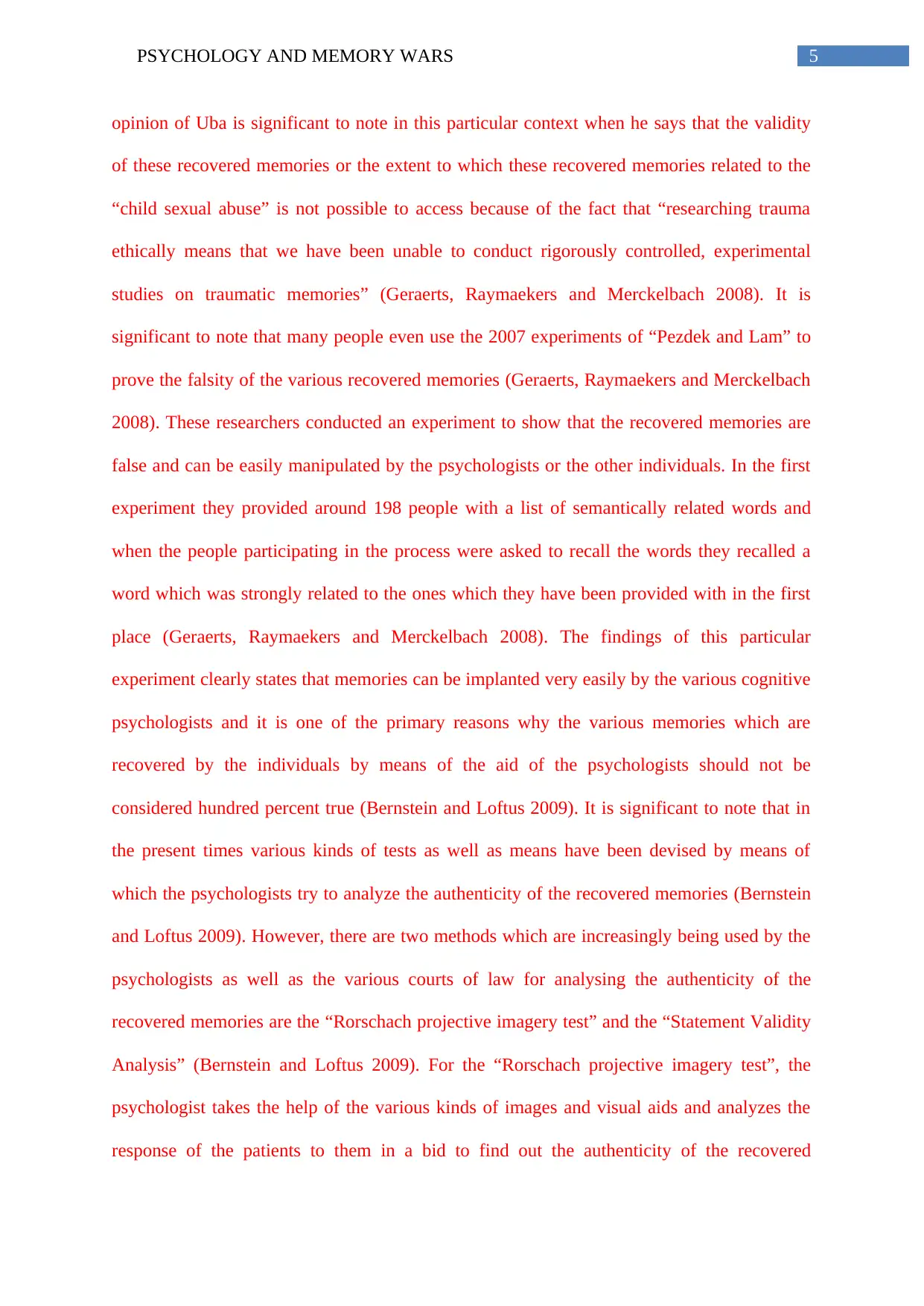
5PSYCHOLOGY AND MEMORY WARS
opinion of Uba is significant to note in this particular context when he says that the validity
of these recovered memories or the extent to which these recovered memories related to the
“child sexual abuse” is not possible to access because of the fact that “researching trauma
ethically means that we have been unable to conduct rigorously controlled, experimental
studies on traumatic memories” (Geraerts, Raymaekers and Merckelbach 2008). It is
significant to note that many people even use the 2007 experiments of “Pezdek and Lam” to
prove the falsity of the various recovered memories (Geraerts, Raymaekers and Merckelbach
2008). These researchers conducted an experiment to show that the recovered memories are
false and can be easily manipulated by the psychologists or the other individuals. In the first
experiment they provided around 198 people with a list of semantically related words and
when the people participating in the process were asked to recall the words they recalled a
word which was strongly related to the ones which they have been provided with in the first
place (Geraerts, Raymaekers and Merckelbach 2008). The findings of this particular
experiment clearly states that memories can be implanted very easily by the various cognitive
psychologists and it is one of the primary reasons why the various memories which are
recovered by the individuals by means of the aid of the psychologists should not be
considered hundred percent true (Bernstein and Loftus 2009). It is significant to note that in
the present times various kinds of tests as well as means have been devised by means of
which the psychologists try to analyze the authenticity of the recovered memories (Bernstein
and Loftus 2009). However, there are two methods which are increasingly being used by the
psychologists as well as the various courts of law for analysing the authenticity of the
recovered memories are the “Rorschach projective imagery test” and the “Statement Validity
Analysis” (Bernstein and Loftus 2009). For the “Rorschach projective imagery test”, the
psychologist takes the help of the various kinds of images and visual aids and analyzes the
response of the patients to them in a bid to find out the authenticity of the recovered
opinion of Uba is significant to note in this particular context when he says that the validity
of these recovered memories or the extent to which these recovered memories related to the
“child sexual abuse” is not possible to access because of the fact that “researching trauma
ethically means that we have been unable to conduct rigorously controlled, experimental
studies on traumatic memories” (Geraerts, Raymaekers and Merckelbach 2008). It is
significant to note that many people even use the 2007 experiments of “Pezdek and Lam” to
prove the falsity of the various recovered memories (Geraerts, Raymaekers and Merckelbach
2008). These researchers conducted an experiment to show that the recovered memories are
false and can be easily manipulated by the psychologists or the other individuals. In the first
experiment they provided around 198 people with a list of semantically related words and
when the people participating in the process were asked to recall the words they recalled a
word which was strongly related to the ones which they have been provided with in the first
place (Geraerts, Raymaekers and Merckelbach 2008). The findings of this particular
experiment clearly states that memories can be implanted very easily by the various cognitive
psychologists and it is one of the primary reasons why the various memories which are
recovered by the individuals by means of the aid of the psychologists should not be
considered hundred percent true (Bernstein and Loftus 2009). It is significant to note that in
the present times various kinds of tests as well as means have been devised by means of
which the psychologists try to analyze the authenticity of the recovered memories (Bernstein
and Loftus 2009). However, there are two methods which are increasingly being used by the
psychologists as well as the various courts of law for analysing the authenticity of the
recovered memories are the “Rorschach projective imagery test” and the “Statement Validity
Analysis” (Bernstein and Loftus 2009). For the “Rorschach projective imagery test”, the
psychologist takes the help of the various kinds of images and visual aids and analyzes the
response of the patients to them in a bid to find out the authenticity of the recovered
⊘ This is a preview!⊘
Do you want full access?
Subscribe today to unlock all pages.

Trusted by 1+ million students worldwide
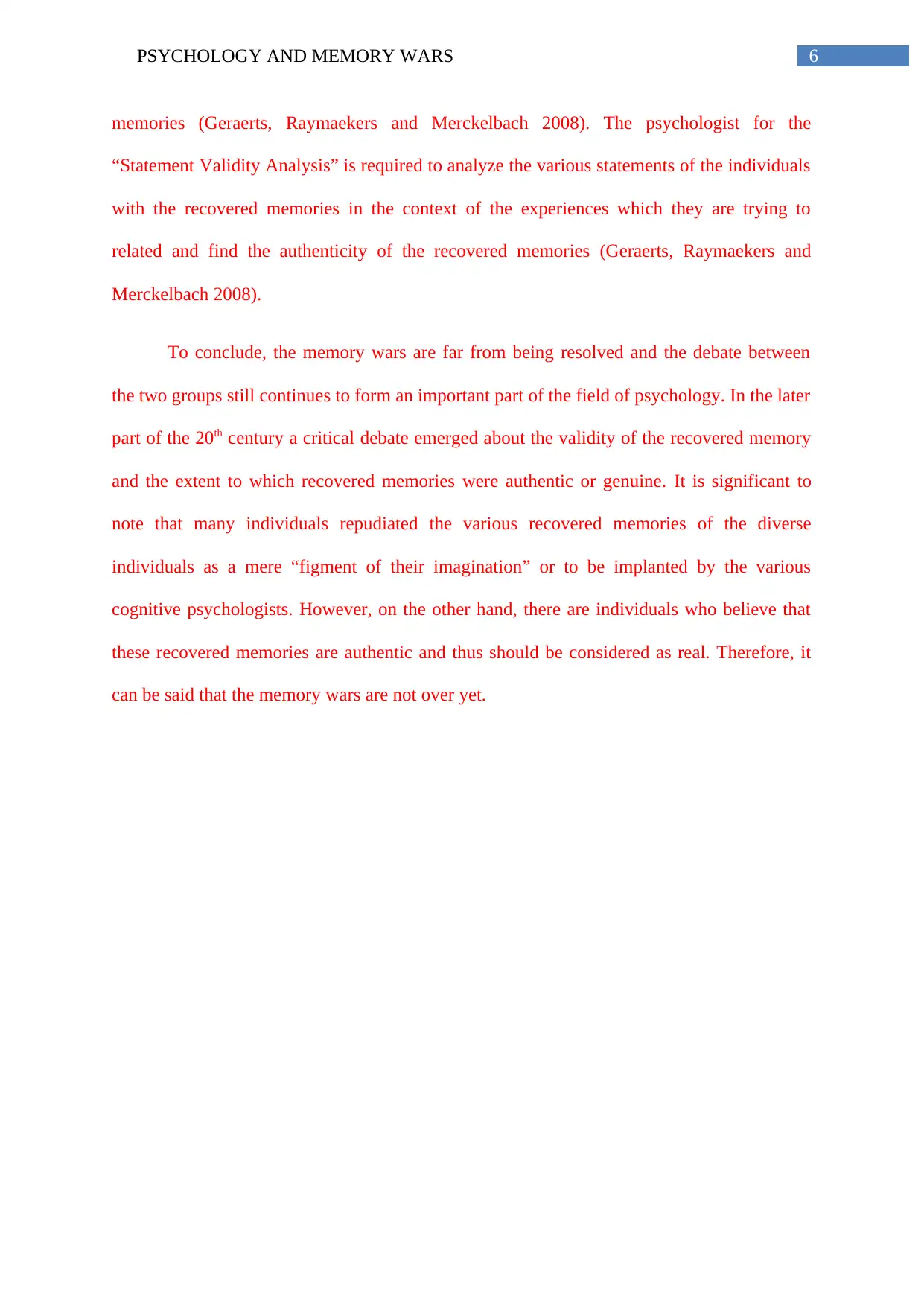
6PSYCHOLOGY AND MEMORY WARS
memories (Geraerts, Raymaekers and Merckelbach 2008). The psychologist for the
“Statement Validity Analysis” is required to analyze the various statements of the individuals
with the recovered memories in the context of the experiences which they are trying to
related and find the authenticity of the recovered memories (Geraerts, Raymaekers and
Merckelbach 2008).
To conclude, the memory wars are far from being resolved and the debate between
the two groups still continues to form an important part of the field of psychology. In the later
part of the 20th century a critical debate emerged about the validity of the recovered memory
and the extent to which recovered memories were authentic or genuine. It is significant to
note that many individuals repudiated the various recovered memories of the diverse
individuals as a mere “figment of their imagination” or to be implanted by the various
cognitive psychologists. However, on the other hand, there are individuals who believe that
these recovered memories are authentic and thus should be considered as real. Therefore, it
can be said that the memory wars are not over yet.
memories (Geraerts, Raymaekers and Merckelbach 2008). The psychologist for the
“Statement Validity Analysis” is required to analyze the various statements of the individuals
with the recovered memories in the context of the experiences which they are trying to
related and find the authenticity of the recovered memories (Geraerts, Raymaekers and
Merckelbach 2008).
To conclude, the memory wars are far from being resolved and the debate between
the two groups still continues to form an important part of the field of psychology. In the later
part of the 20th century a critical debate emerged about the validity of the recovered memory
and the extent to which recovered memories were authentic or genuine. It is significant to
note that many individuals repudiated the various recovered memories of the diverse
individuals as a mere “figment of their imagination” or to be implanted by the various
cognitive psychologists. However, on the other hand, there are individuals who believe that
these recovered memories are authentic and thus should be considered as real. Therefore, it
can be said that the memory wars are not over yet.
Paraphrase This Document
Need a fresh take? Get an instant paraphrase of this document with our AI Paraphraser
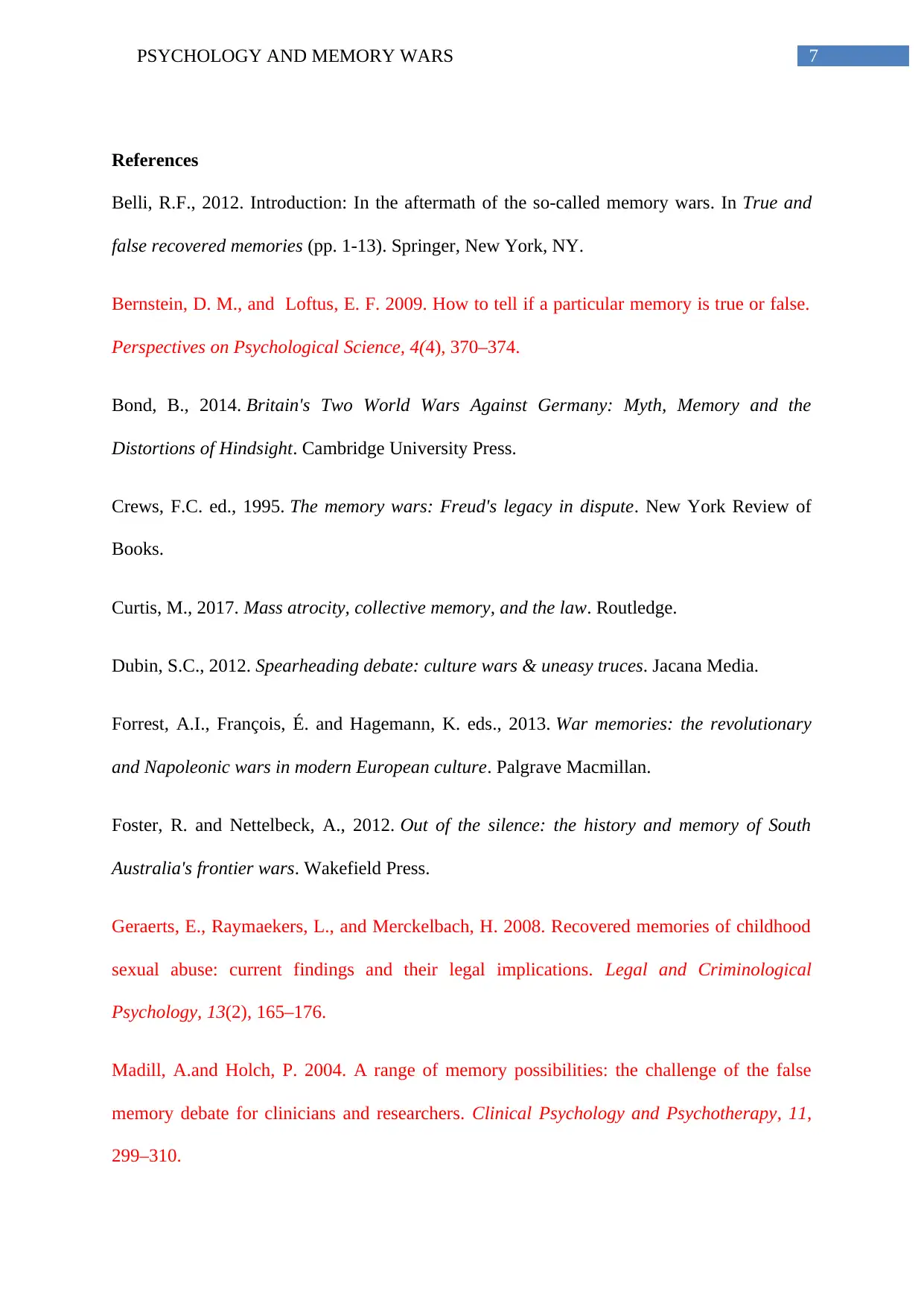
7PSYCHOLOGY AND MEMORY WARS
References
Belli, R.F., 2012. Introduction: In the aftermath of the so-called memory wars. In True and
false recovered memories (pp. 1-13). Springer, New York, NY.
Bernstein, D. M., and Loftus, E. F. 2009. How to tell if a particular memory is true or false.
Perspectives on Psychological Science, 4(4), 370–374.
Bond, B., 2014. Britain's Two World Wars Against Germany: Myth, Memory and the
Distortions of Hindsight. Cambridge University Press.
Crews, F.C. ed., 1995. The memory wars: Freud's legacy in dispute. New York Review of
Books.
Curtis, M., 2017. Mass atrocity, collective memory, and the law. Routledge.
Dubin, S.C., 2012. Spearheading debate: culture wars & uneasy truces. Jacana Media.
Forrest, A.I., François, É. and Hagemann, K. eds., 2013. War memories: the revolutionary
and Napoleonic wars in modern European culture. Palgrave Macmillan.
Foster, R. and Nettelbeck, A., 2012. Out of the silence: the history and memory of South
Australia's frontier wars. Wakefield Press.
Geraerts, E., Raymaekers, L., and Merckelbach, H. 2008. Recovered memories of childhood
sexual abuse: current findings and their legal implications. Legal and Criminological
Psychology, 13(2), 165–176.
Madill, A.and Holch, P. 2004. A range of memory possibilities: the challenge of the false
memory debate for clinicians and researchers. Clinical Psychology and Psychotherapy, 11,
299–310.
References
Belli, R.F., 2012. Introduction: In the aftermath of the so-called memory wars. In True and
false recovered memories (pp. 1-13). Springer, New York, NY.
Bernstein, D. M., and Loftus, E. F. 2009. How to tell if a particular memory is true or false.
Perspectives on Psychological Science, 4(4), 370–374.
Bond, B., 2014. Britain's Two World Wars Against Germany: Myth, Memory and the
Distortions of Hindsight. Cambridge University Press.
Crews, F.C. ed., 1995. The memory wars: Freud's legacy in dispute. New York Review of
Books.
Curtis, M., 2017. Mass atrocity, collective memory, and the law. Routledge.
Dubin, S.C., 2012. Spearheading debate: culture wars & uneasy truces. Jacana Media.
Forrest, A.I., François, É. and Hagemann, K. eds., 2013. War memories: the revolutionary
and Napoleonic wars in modern European culture. Palgrave Macmillan.
Foster, R. and Nettelbeck, A., 2012. Out of the silence: the history and memory of South
Australia's frontier wars. Wakefield Press.
Geraerts, E., Raymaekers, L., and Merckelbach, H. 2008. Recovered memories of childhood
sexual abuse: current findings and their legal implications. Legal and Criminological
Psychology, 13(2), 165–176.
Madill, A.and Holch, P. 2004. A range of memory possibilities: the challenge of the false
memory debate for clinicians and researchers. Clinical Psychology and Psychotherapy, 11,
299–310.
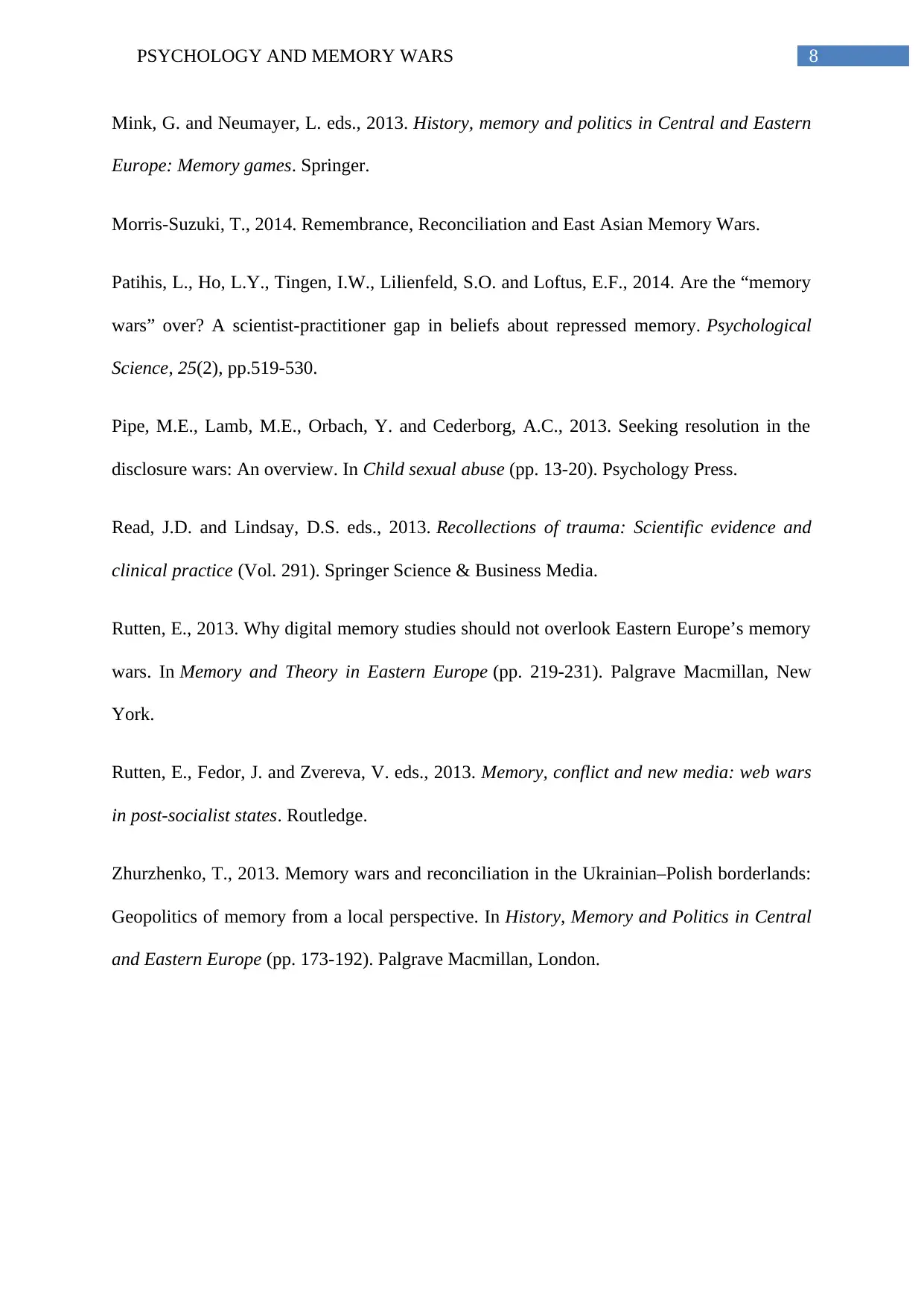
8PSYCHOLOGY AND MEMORY WARS
Mink, G. and Neumayer, L. eds., 2013. History, memory and politics in Central and Eastern
Europe: Memory games. Springer.
Morris-Suzuki, T., 2014. Remembrance, Reconciliation and East Asian Memory Wars.
Patihis, L., Ho, L.Y., Tingen, I.W., Lilienfeld, S.O. and Loftus, E.F., 2014. Are the “memory
wars” over? A scientist-practitioner gap in beliefs about repressed memory. Psychological
Science, 25(2), pp.519-530.
Pipe, M.E., Lamb, M.E., Orbach, Y. and Cederborg, A.C., 2013. Seeking resolution in the
disclosure wars: An overview. In Child sexual abuse (pp. 13-20). Psychology Press.
Read, J.D. and Lindsay, D.S. eds., 2013. Recollections of trauma: Scientific evidence and
clinical practice (Vol. 291). Springer Science & Business Media.
Rutten, E., 2013. Why digital memory studies should not overlook Eastern Europe’s memory
wars. In Memory and Theory in Eastern Europe (pp. 219-231). Palgrave Macmillan, New
York.
Rutten, E., Fedor, J. and Zvereva, V. eds., 2013. Memory, conflict and new media: web wars
in post-socialist states. Routledge.
Zhurzhenko, T., 2013. Memory wars and reconciliation in the Ukrainian–Polish borderlands:
Geopolitics of memory from a local perspective. In History, Memory and Politics in Central
and Eastern Europe (pp. 173-192). Palgrave Macmillan, London.
Mink, G. and Neumayer, L. eds., 2013. History, memory and politics in Central and Eastern
Europe: Memory games. Springer.
Morris-Suzuki, T., 2014. Remembrance, Reconciliation and East Asian Memory Wars.
Patihis, L., Ho, L.Y., Tingen, I.W., Lilienfeld, S.O. and Loftus, E.F., 2014. Are the “memory
wars” over? A scientist-practitioner gap in beliefs about repressed memory. Psychological
Science, 25(2), pp.519-530.
Pipe, M.E., Lamb, M.E., Orbach, Y. and Cederborg, A.C., 2013. Seeking resolution in the
disclosure wars: An overview. In Child sexual abuse (pp. 13-20). Psychology Press.
Read, J.D. and Lindsay, D.S. eds., 2013. Recollections of trauma: Scientific evidence and
clinical practice (Vol. 291). Springer Science & Business Media.
Rutten, E., 2013. Why digital memory studies should not overlook Eastern Europe’s memory
wars. In Memory and Theory in Eastern Europe (pp. 219-231). Palgrave Macmillan, New
York.
Rutten, E., Fedor, J. and Zvereva, V. eds., 2013. Memory, conflict and new media: web wars
in post-socialist states. Routledge.
Zhurzhenko, T., 2013. Memory wars and reconciliation in the Ukrainian–Polish borderlands:
Geopolitics of memory from a local perspective. In History, Memory and Politics in Central
and Eastern Europe (pp. 173-192). Palgrave Macmillan, London.
⊘ This is a preview!⊘
Do you want full access?
Subscribe today to unlock all pages.

Trusted by 1+ million students worldwide
1 out of 9
Your All-in-One AI-Powered Toolkit for Academic Success.
+13062052269
info@desklib.com
Available 24*7 on WhatsApp / Email
![[object Object]](/_next/static/media/star-bottom.7253800d.svg)
Unlock your academic potential
Copyright © 2020–2026 A2Z Services. All Rights Reserved. Developed and managed by ZUCOL.
